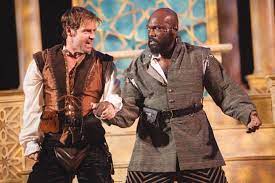At the very heart of Othello lies the question of Iago’s motive for what he did. Iago stands in a long line of Shakespearean villains who pursue their perverse course with delight. At one level we are horrified by the depth of their villainy but at another level we are fascinated by them. We fascinated by the skill with which he conceals his villainy from the rest of the cast. While being appalled by the purpose of the villain, we, as the audience, are flattered by the knowledge that we alone fully aware of the purpose revealed to us through his soliloquies. In a way, we the audience, have the dubious honour of being the villain’s accomplices – though we have access to the purpose of the villain, we are prevented from revealing it to the victims of the villain’s plot by dramatic conventions.
Despite our awareness of the truth of the villain, that s/he is “subtle, false and treacherous” (Richard III, I.i. 37), we are attracted by him/her. The reason for this could be that we can indulge ourselves in our fascination of the evil vicariously because we are at a safe distance from the figure of evil so that they could not harm us (?). In a way, the experience could also be cathartic.
The ideas put forward by Machiavelli in The Prince (1513) seem to have a profound impact on the construction
of the Renaissance/Shakespearean villain. In Shakespeare’s days the term
Machiavelli was synonymous with hypocrisy and deceit. Villains in the
Renaissance theatre often invoke Machiavelli in defining their thinking and
actions. However, Iago departs from this tradition probably due to his sense of
uniqueness/ egoism – he believes that he is one of a kind. However, Act II.iii.
326-329 he makes an allusion to The
Prince:
And what’s he then, that says I play
the villain,
When this advice is free I free,
and honest,
Probal to thinking, and indeed the
course
To win the Moor again?
Iago take pride in playing the “honest Iago”; therefore, the
actor who plays the role Iago, would have to play a part in which the part
plays another part.
Only the audience and Roderigo are privy to the fact that Iago is a villain. Throughout the play, Iago is associated with the term “honest” – true-hearted, trustworthy, straightforward, forthright and sincere. Iago had acquired a reputation of a plain-speaking practical sort of a person as a soldier. Off the battlefield, he appears the very epitome of dutifulness and dependability. It is a sign of Iago’s genius that not only had he been able to create such an image but also he had been able to sustain that image to the very end in the eyes of all the characters. He takes immense pleasure in savoring the success of his image. In the first of his frequent aides he confides in the audience of the inner-workings of his mind thus:
In following him, I follow but
myself.
Heaven is my judge, not I for love
and duty.
But seeming so, for my peculiar
end.
For when my outward action does
demonstrate
The native act, and figure of my
heart,
In complement extern, ‘tis not long
after,
But I will wear my heart upon my
sleeve,
For doves to peck at: I am not what
I am. (I.i 58-65)
True Iago feels only contempt for Roderigo and refers to him
using the most unbecoming appelations such as snipe, trash and quod while
pretending to be his benefactor whose sole objective is to ensure that Roderigo
gets his heart’s desire. When he superflues, and even dangerous to his cause,
Iago kills Roderigo without a hesitation. While it may not have taken much to
gull Roderigo, fooling Cassio should have offered a greater challenge. Yet,
this too Iago manages with aplomb. He masterminds the plot to disgrace Cassio
so that he would be removed from his post without drawing a shade of suspicion
on him. In fact Othello assumes that Iago is out of his “honesty and love doth
mince the matter, Making it light to Cassio” (II.iii 238-239). He encourages Cassio to appeal to Desdemona to
get his position back so that he could find an opportunity to strengthen the
suspicion he aimed to plant in Othello’s mind regarding the true nature of
their relationship. His tongue-in-the-cheek announcement in II.iii323 that his
advice is free and honest “probal to thinking and indeed the course, to win the
Moor again” gives us an insight to how Iago operates and the complexity of
Iago’s villainous plots.
Similarly, in IV.i, when Ludovico is appalled by Othello
slapping Desdemona in front of him Iago plays the loyal friend and says “its
not honesty in me to speak What I have seen and known” (275-76)
and damns Othello further by his apparent reluctance to discredit his lord. When
Othello calls Desdemona a whore Iago pretends to sympathize with her and be
shocked by Othello’s suspicions – the suspicions he himself had planted and
carefully nurtured. After wounding Cassio subsequent to the failed plot of get
him killed by Roderigo he pretend concern for Cassio thereby presenting himself
as witness to the crime and turns upon his pawn and injures him fatally –
killing two birds with one stone: he does not have to pay back the gifts and
his part in the plot would not be revealed.
His reputation as “honest Iago” – in its many shades - is so
firmly established in the minds of all the actors, that no one casts any
aspirations on his trustworthiness, etc. throughout the play until the very end.


.jpg)


No comments:
Post a Comment